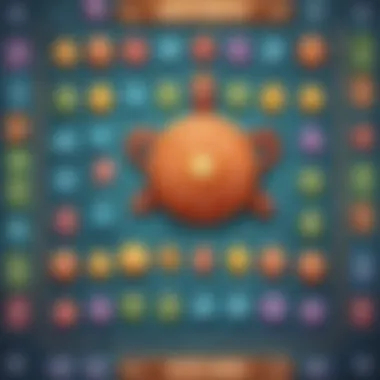Discover Engaging and Free Math Games for Kids on Gigglyx - A Journey of Learning and Fun


Educational Games
When it comes to educational games on Gigglyx, children are presented with a myriad of opportunities to enhance their mathematical and logical reasoning skills in a fun and engaging manner. These games not only make learning enjoyable but also foster a deeper understanding of mathematical concepts. From simple addition and subtraction games to more complex logic puzzles, Gigglyx offers a wide range of interactive experiences that cater to children of all ages and skill levels. By immersing themselves in these stimulating activities, kids can develop critical thinking skills and improve their problem-solving abilities.
Math and Logic Games
Mathematics can often be perceived as a daunting subject, but on Gigglyx, math becomes an exciting adventure. Through a variety of math and logic games, children can practice key mathematical operations such as multiplication, division, fractions, and more in a playful context. These games are designed to challenge young minds, encouraging them to think strategically and analytically. By solving math problems within the engaging narratives of the games, children can hone their arithmetic skills while having a great time.
Equally important are the logic games available on Gigglyx, which require kids to apply reasoning and deduction to solve puzzles and unravel mysteries. These games help sharpen cognitive skills, boost memory retention, and promote logical thinking. With themes ranging from detective mysteries to ancient treasure hunts, Gigglyx ensures that children are not only entertained but also intellectually stimulated.
Language and Vocabulary Games
In addition to math and logic games, Gigglyx offers a diverse selection of language and vocabulary games that aim to improve children's linguistic abilities. From word scrambles to vocabulary quizzes, these games are designed to expand kids' vocabulary, enhance their spelling skills, and foster a love for language. By engaging with playful activities that revolve around words and phrases, children can develop strong communication skills and a deeper appreciation for the nuances of language.
STEM Activities
STEM (Science, Technology, Engineering, Mathematics) activities are integrated into Gigglyx's educational games to provide children with hands-on experiences that promote inquiry-based learning. By participating in STEM challenges and experiments, kids can explore scientific concepts, engage in problem-based learning, and cultivate a passion for discovery. Whether it's building miniature bridges, conducting simple chemical reactions, or constructing basic circuits, these activities instill a sense of curiosity and creativity in young learners, encouraging them to ask questions, test hypotheses, and explore the world around them.
History and Geography Puzzles
For children fascinated by the past and the world around them, Gigglyx offers history and geography puzzles that transport them to different eras and locations. Through interactive games that delve into historical events, famous landmarks, and global cultures, kids can broaden their knowledge of history and geography in an entertaining way. By solving puzzles related to ancient civilizations, world maps, and historical figures, children can develop a deeper understanding of the world's diverse cultures and rich heritage.
Interactive Learning Apps
To make the learning experience even more dynamic, Gigglyx features interactive learning apps that combine educational content with engaging gameplay. These apps cover a wide range of subjects, from math and science to language arts and social studies, providing children with a holistic educational experience. By using interactive apps that adapt to their learning pace and style, kids can explore concepts in depth, receive immediate feedback, and track their progress over time. With Gigglyx's interactive learning apps, children can embark on a personalized learning journey that caters to their individual needs and interests.
Introduction to Gigglyx
In this article, we embark on a thrilling journey into the realm of Gigglyx, a captivating online platform designed to enrich children's math learning experience. Gigglyx stands out as a beacon of educational entertainment, offering a vast array of interactive math games that spark curiosity and foster a love for numbers. As we delve into the depths of Gigglyx, we uncover a treasure trove of opportunities for young minds to explore the beauty of mathematics in a fun and engaging manner.
One of the key elements that make Gigglyx a standout platform is its seamless blend of education and entertainment. By infusing learning with elements of playfulness and enjoyment, Gigglyx redefines traditional approaches to math education, making it more accessible and engaging for children. Through a diverse range of games and activities, Gigglyx nurtures not only mathematical skills but also critical thinking, problem-solving abilities, and a deep-seated appreciation for the subject.


Moreover, Gigglyx prioritizes inclusivity and accessibility, catering to children of all ages and skill levels. Whether a young learner is taking their first steps in the world of numbers or seeking to enhance their math proficiency, Gigglyx offers a supportive and engaging environment for all. This commitment to diversity ensures that every child can find joy and fulfillment in exploring math through the platform's interactive games and challenges.
Furthermore, Gigglyx places a strong emphasis on the holistic development of children, recognizing the interconnected nature of cognitive, emotional, and social growth. Through its engaging math games, Gigglyx not only enhances mathematical aptitude but also nurtures essential life skills such as perseverance, resilience, and collaboration. By immersing children in a dynamic and enriching learning environment, Gigglyx equips them with the tools they need to succeed academically and thrive in an ever-evolving world.
In essence, Gigglyx serves as a bridge between education and entertainment, offering a groundbreaking platform where children can discover the joy of math while honing their cognitive abilities and soft skills. By exploring the vibrant world of Gigglyx, young learners embark on a transformative educational journey filled with excitement, discovery, and boundless opportunities for growth and learning.
The Importance of Math Games for Kids
Invaluable Learning Tools
Math games for kids serve as invaluable learning tools, fostering crucial skills in problem-solving, critical thinking, and numerical fluency. By engaging with math in a playful and interactive manner, children develop a strong foundation in mathematics from an early age. These games not only enhance academic performance but also nurture a positive attitude towards the subject, leading to long-term benefits in academic and personal growth.
Enhancing Cognitive Development
The significance of math games lies in their ability to enhance cognitive development. Through the challenges presented in these games, children enhance their logic, reasoning, and spatial awareness skills. The mental agility required to tackle math problems in a gaming environment sharpens their minds and prepares them to tackle real-life mathematical challenges with confidence and precision.
Promoting Engagement and Retention
One cannot overlook the role of math games in promoting engagement and retention of mathematical concepts. Unlike traditional teaching methods, games on platforms like Gigglyx offer interactive and dynamic experiences that keep children engrossed and motivated to learn. The interactive nature of these games ensures that concepts are not just learned but retained effectively, leading to a deeper understanding of mathematical principles.
Fostering Collaboration and Competition
Math games for kids often incorporate elements of collaboration and friendly competition, fostering social skills alongside mathematical proficiency. Children learn to work together to solve problems, communicate their reasoning, and appreciate diverse approaches to problem-solving. Furthermore, healthy competition in games sparks a desire for self-improvement and achievement, motivating children to excel in their mathematical capabilities.
Conclusion
Exploring the World of Fun Math Games
As we embark on this journey of exploring fun math games for kids on Gigglyx, we are transported into a realm where education seamlessly merges with entertainment. The significance of this exploration lies in its ability to revolutionize how children perceive and engage with mathematics. By intertwining fun elements with mathematical concepts, these games have the potential to ignite a passion for learning within young minds.
Math Puzzles and Riddles
Within the realm of math puzzles and riddles, children are presented with challenges that not only test their problem-solving skills but also nurture critical and analytical thinking. These engaging activities act as brain teasers, stimulating cognitive abilities while concurrently strengthening mathematical proficiency. Through deciphering puzzles and unraveling riddles, children hone their logic and reasoning, laying a solid foundation for more complex mathematical concepts.


Math Board Games
Math board games offer a tactile and interactive approach to learning, providing a hands-on experience that enhances retention and comprehension. By combining elements of strategy and chance, these games promote strategic thinking and decision-making skills. The physical presence of a board and game pieces adds a dimension of sensory input, making the learning process more dynamic and engaging for young learners.
Interactive Online Math Games
The realm of interactive online math games opens up a myriad of possibilities for children to explore mathematical concepts in a digital landscape. Through gamified learning experiences, kids are immersed in virtual worlds where numbers and equations come to life. Subsections dedicated to addition, subtraction, multiplication, and division games offer targeted practice in each area, catering to the specific needs and skill development of individual players.
Subsection for Addition Games
Delving into the realm of addition games, players engage in activities that reinforce their understanding of adding numbers together. By focusing on increasing computational speed and accuracy, addition games promote fluency in basic mathematical operations. The interactive nature of these games keeps learners actively involved, fostering a deeper appreciation for the beauty of mathematics.
Subsection for Subtraction Games
Subtraction games offer a unique avenue for children to master the art of subtracting numbers with ease and precision. By tackling subtraction challenges in a fun and stimulating environment, players develop the skill of deduction and numerical manipulation. The progressive difficulty levels in these games ensure a gradual build-up of subtraction proficiency, consolidating mathematical concepts along the way.
Subsection for Multiplication Games
In the realm of multiplication games, children are presented with opportunities to enhance their multiplication skills through repetitive practice and engaging tasks. By reinforcing multiplication tables and promoting quick mental calculations, these games instill a sense of numerical confidence in young learners. The interactive feedback and rewards system in multiplication games keep players motivated and invested in their mathematical growth.
Subsection for Division Games
Exploring division games unveils a world where dividing numbers becomes an enjoyable and enlightening experience. By breaking down complex division problems into manageable tasks, children develop a solid grasp of division principles. The interactive nature of division games fosters conceptual understanding, ensuring that players approach mathematical challenges with confidence and proficiency.
Benefits of Playing Math Games
Playing math games offers a multitude of benefits for children's cognitive development. These games provide an interactive and engaging way for kids to enhance their math skills while having fun. By incorporating playful elements into learning, math games can significantly improve children's problem-solving abilities, critical thinking skills, and numeracy proficiency. Moreover, these games promote a positive attitude towards mathematics, making it a more enjoyable and less intimidating subject for young learners. Through regular exposure to math games, children can build confidence in their mathematical capabilities, fostering a growth mindset that emphasizes perseverance and skill improvement.
Through the lens of cognitive psychology, math games stimulate various areas of the brain associated with logical reasoning, spatial awareness, and memory retention. By engaging in strategic gameplay and solving mathematical challenges, children can enhance their concentration, focus, and attention to detail. These skills are not only vital for academic success but also have practical applications in real-world scenarios, such as problem-solving in everyday tasks or making informed decisions based on numerical data. By honing these cognitive abilities through math games, children can develop a strong foundation for lifelong learning and analytical thinking.
In addition to cognitive benefits, playing math games offers social and emotional advantages for children. Many math games are designed for multiplayer or cooperative play, encouraging teamwork, communication, and sportsmanship. Through collaborative gameplay, kids can learn how to work effectively in groups, share ideas, and support one another's learning progress. This fosters a sense of community and camaraderie, promoting positive social interactions and building interpersonal skills that are essential for success in both academic and personal relationships. Furthermore, overcoming challenges in math games can boost children's self-esteem and resilience, teaching them valuable lessons about perseverance and problem-solving in the face of adversity.
Parents and educators play a crucial role in maximizing the benefits of math games for children. By actively participating in gameplay, parents can support their child's learning journey, provide encouragement, and celebrate their achievements. Furthermore, educators can integrate math games into lesson plans, reinforcing key mathematical concepts and making learning more engaging and dynamic. By fostering a collaborative environment that values experiential learning and exploration, both parents and educators can empower children to develop a deep appreciation for mathematics and cultivate a lifelong passion for learning.


Tips for Parents and Educators
In this section, we will delve into essential information on how parents and educators can optimize the learning experience of children through math games on Gigglyx. Parents and educators play a pivotal role in cultivating an enriching environment for children to explore the world of mathematics.
Math games offer a unique opportunity for children to learn through play. By incorporating these games into daily routines, parents and educators can enhance a child's cognitive development and problem-solving skills while making learning enjoyable and accessible. Through strategic integration of math games, children can grasp mathematical concepts in a practical and engaging manner.
Moreover, math games serve as a bridge between theoretical learning and real-world application. Parents and educators can utilize these games to reinforce classroom teachings, allowing children to develop a deeper understanding of mathematical principles through hands-on practice. By encouraging regular participation in math games, parents and educators can create a supportive learning environment that nurtures curiosity, critical thinking, and a love for learning.
When selecting math games for children, parents and educators should consider the child's age, interests, and learning objectives. By tailoring game choices to suit the individual needs of the child, they can promote active engagement and sustained interest in mathematics. Additionally, creating a positive and encouraging atmosphere around math games can boost a child's confidence and motivation to tackle new challenges.
By following these tips, parents and educators can maximize the educational benefits of math games on Gigglyx while fostering a love for learning and exploration in children.
Incorporating Math Games into Learning
To enhance the learning experience, it is crucial to integrate math games seamlessly into the child's educational journey. By aligning game themes with classroom topics, parents and educators can reinforce core concepts in an interactive and engaging manner.
One effective approach is to introduce math games as supplementary learning tools that complement formal curriculum objectives. By connecting game activities with classroom lessons, children can deepen their understanding of mathematical concepts while enjoying a dynamic learning experience.
Furthermore, parents and educators can leverage the adaptability of math games to cater to different learning styles and paces. By providing varied game options that focus on diverse areas of mathematics, they can accommodate individual preferences and learning needs. This approach not only enhances retention and comprehension but also fosters a strong affinity for math in children.
By integrating math games into daily learning routines, parents and educators can create a stimulating and immersive educational environment that promotes exploration, creativity, and critical thinking skills. Through strategic incorporation of math games, children can develop a solid foundation in mathematics while cultivating a passion for continuous learning.
Encouraging Math Skills Development
In this section, we will explore effective strategies for nurturing math skills development in children through interactive gameplay on Gigglyx. Encouraging the enhancement of math skills is essential in supporting children's overall academic growth and cognitive abilities.
One key aspect of fostering math skills development is to create a supportive and encouraging learning atmosphere. By emphasizing the importance of practice and perseverance, parents and educators can instill a growth mindset in children, motivating them to tackle mathematical challenges with confidence and resilience.
Furthermore, frequent engagement with math games not only enhances numerical proficiency but also cultivates critical thinking and analytical reasoning skills. By incorporating gameplay that involves strategic decision-making and problem-solving, children can sharpen their cognitive abilities while enjoying the thrill of interactive challenges.
To facilitate holistic math skills development, parents and educators should provide constructive feedback and positive reinforcement during gameplay. Recognizing and celebrating small achievements can boost a child's self-esteem and motivation to excel in mathematical tasks, fostering a sense of accomplishment and empowerment.
By encouraging consistent participation in math games and celebrating progress, parents and educators can nurture a positive attitude towards math while fostering a growth-oriented mindset in children. Through a combined effort to support math skills development, children can discover the joy of learning and excel in their mathematical pursuits on Gigglyx.
Conclusion
Moreover, the impact of these math games reverberates beyond the confines of traditional education, offering a hands-on approach that fosters creativity, perseverance, and a sense of accomplishment. As children navigate through the diverse array of games available on Gigglyx, they not only acquire mathematical proficiency but also develop essential life skills vital for their holistic growth and development.
Parents, educators, and guardians stand to benefit immensely from the insights gleaned in this article, recognizing the instrumental role math games play in complementing formal learning structures and nurturing a passion for numerical reasoning in children. By leveraging the power of play, adults can create an immersive learning environment that is both enriching and enjoyable, fostering a love for math that extends far beyond the confines of the classroom.



